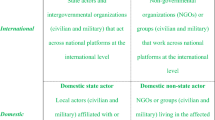
Overview
- Focuses on the question of how international bureaucracies become knowledgeable actors in world politics
- Interested in understanding how international bureaucracies develop knowledge and become experts
- Offers an analysis of the UN Environment Programme and UNEP’s Environmental Cooperation for Peacebuilding programme
Access this book
Tax calculation will be finalised at checkout
Other ways to access
About this book
By analyzing the UN Environment Programme’s (UNEP’s) contribution to peacebuilding, this book aims to show how international bureaucracies develop knowledge and thereby come to matter on the world stage. Portraying UNEP as an open system, it explores how a growing understanding within the Programme of how environmental degradation shapes insecurities and vice versa has motivated its work on peacebuilding. The theoretical part of this book addresses knowledge, open systems, and knowledge creation. It then presents a historical discussion of UNEP’s development in an open system context. Finally, it investigates how knowledge emergence on the linkage between the environment, conflicts, and insecurities influenced UNEP’s interests and its work on environmental peacebuilding.
Similar content being viewed by others
Keywords
- Environmental peace
- United Nations
- UN Environment Programme
- Environmental Cooperation for Peacebuilding programme
- UNEP
- International bureaucracies
- open systems
- knowledge creation
- inter-organizational cooperation
- environmental peacebuilding
- International Organizations
- environmental diplomacy
- climate change
- bureaucratic change
- environmental protection
- international organizations
- environmental policy
- knowledge actor
Table of contents (9 chapters)
-
Front Matter
-
Back Matter
Reviews
“In this era of misinformation, disinformation and fake news, international organizations have an increasingly important role to play as generators, custodians and disseminators of knowledge. Dalmer shows how the United Nations Environment Programme (UNEP) is uniquely situated to make a positive global contribution in this regard. She illustrates in well-researched detail exactly how international bureaucracies become 'knowledge actors' and presents the UNEP as an open system that is crucial to the development of environmental peacebuilding. This book is an essential reference for anyone interested in UN knowledge and how this kind of knowledge may help us all save the planet.” (Nanette Archer Svenson, Centro de Investigación Educativa (CIEDU), República de Panamá, USA)
“Conceiving of international bureaucracies as actors in their own right and drawing from organizational theory and international relations literature, Dalmer illustrates their role as producers of new knowledge. With a focus on UNEP and the different environments from which the organization has obtained new insights regarding environmental peacebuilding, the book not only makes a timely contribution, but readers interested in international institutions and environmental studies will find it of great value.” (Jutta M. Joachim, Radboud University, Nijmegen, Netherlands)
Authors and Affiliations
About the author
Natalia Dalmer is a researcher at the Institute of Political Science at Leibniz University Hannover, Germany. She works on international bureaucracies, knowledge, and environmental politics.
Bibliographic Information
Book Title: Building Environmental Peace
Book Subtitle: The UN Environment Programme as a Knowledge Actor
Authors: Natalia Dalmer
DOI: https://doi.org/10.1007/978-3-030-72094-0
Publisher: Palgrave Macmillan Cham
eBook Packages: Political Science and International Studies, Political Science and International Studies (R0)
Copyright Information: The Editor(s) (if applicable) and The Author(s), under exclusive license to Springer Nature Switzerland AG 2022
Hardcover ISBN: 978-3-030-72093-3Published: 18 March 2022
Softcover ISBN: 978-3-030-72096-4Published: 19 March 2023
eBook ISBN: 978-3-030-72094-0Published: 17 March 2022
Edition Number: 1
Number of Pages: XIX, 280
Number of Illustrations: 13 b/w illustrations
Topics: International Organization, Environmental Policy, International Relations



